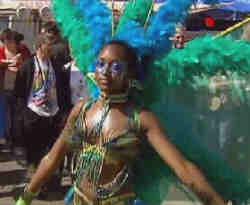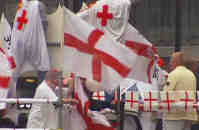Nationalism – Big Ideas
David Blunkett
Nationalism – A Sense of Belonging

David Blunkett
This is the story of an idea that has radically shaped our lives over centuries. It has fostered freedom and democracy and destroyed oppression but, it has also inspired some of the most horrific acts that human beings have ever committed. This idea is still at the heart of some of the biggest challenges that the world faces today; Immigration, Asylum and Racism. This idea is Nationalism.
David Blunkett, the MP for Sheffield, Brightside and former Home Secretary and Education Secretary shares his views on nationalism Over the past 10 years I’ve become a champion of British National Identity. There is a certain irony to this, because when I started out in politics, over 40 years ago, it was the last thing I thought I would end up doing. My political career has been a journey from a young man deeply sceptical about nationalism and all that it meant in the 20th century through to the present day where I’m now convinced that a sense of identity and belonging is crucial to our well-being.
My own sense of nationalism led to me introduce a number of reforms which I hoped would strengthen a wider national identity, including controversial exams, in English and the British way of life, for everyone who wants to join our country. In 2003, I introduced laws which ensure that all those seeking British citizenship had to take an examination in English and in British values. To obtain a British passport they have to go through a citizenship ceremony and swear allegiance to our country and Queen.
Growing up as a child in post-war Britain made national identity very simple, it was the spirit of the 1940s. For my generation, the war had defined our national identity very clearly. We, the British, had had won the battle against the Germans; we knew who we were.
Today it’s all very much more complicated, our country has changed beyond recognition. Substantial numbers of new migrants have changed the face of Britain and, of course, Britain’s role in the world has changed. All of this has has meant that defining who we are has become much harder. We clearly need a new definition that suits our age. To find one, I believe we need to explore the idea that lies behind national identity; Nationalism.
At the heart of the discussion is a shared human need for a sense of belonging. If you delve into the history books, you can see that people have always yearned for a sense of belonging; to the family, to the tribe, to the people. We’ve always had a fierce passion for the culture of the people we belong to. some of these cultural identities have been around for 2,000 years or more. These passions, strong as they are, are not what we define as nationalism today Quite simply, that’s because the nation state, as we think of it, didn’t exist.
Although people saw themselves as German, Italian or Dutch, in fact, most nation states didn’t come into being until the last 200 years. Until the 16th century, most of Europe was made up large empires, small kingdoms or principalities.
Our relationship with ‘the state’ was also very different to the one we have today. People, literally and legally, belonged to their ruler. They were subjects who could be passed around, like property, between royal families. Changing hands for inheritance, marriage and war. People held duty to their local squire through to the duke or monarch in their region.

Jean Jacques Rousseau
In 1762, the French philosopher, Jean Jacques Rousseau shocked the ruling elite of Europe. He argued that countries should not belong to all-powerful monarchs but, to the people themselves. It was a revolutionary idea and the French Revolution was the result. Between 1789 and 1799, the French revolutionaries abolished the power of the king and gave it to the people.
In a literal sense, the people became the nation of France. The fact that the French now felt that they owned their nation gave them a deeper sense of belonging. For the revolutionaries, this was not enough. They created rituals of modern nationhood, in order to foster national identity. They created the world’s first national anthem; La Marseillaise. They developed the French flag and a national slogan; Liberty, Freedom, Fraternity. At the heart of this movement was a radical principle. It was that anyone, from any country, could become a citizen of the new French nation as long, of course, that they swore allegiance to it’s values. This type of nationalism is called civil nationalism and is the foundation of many modern nation states.

